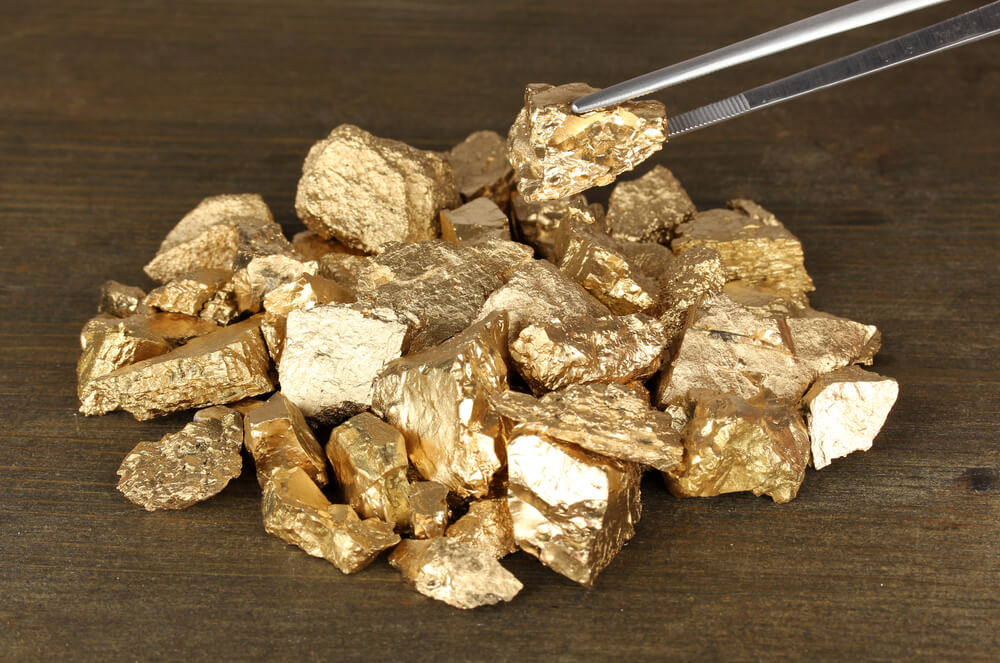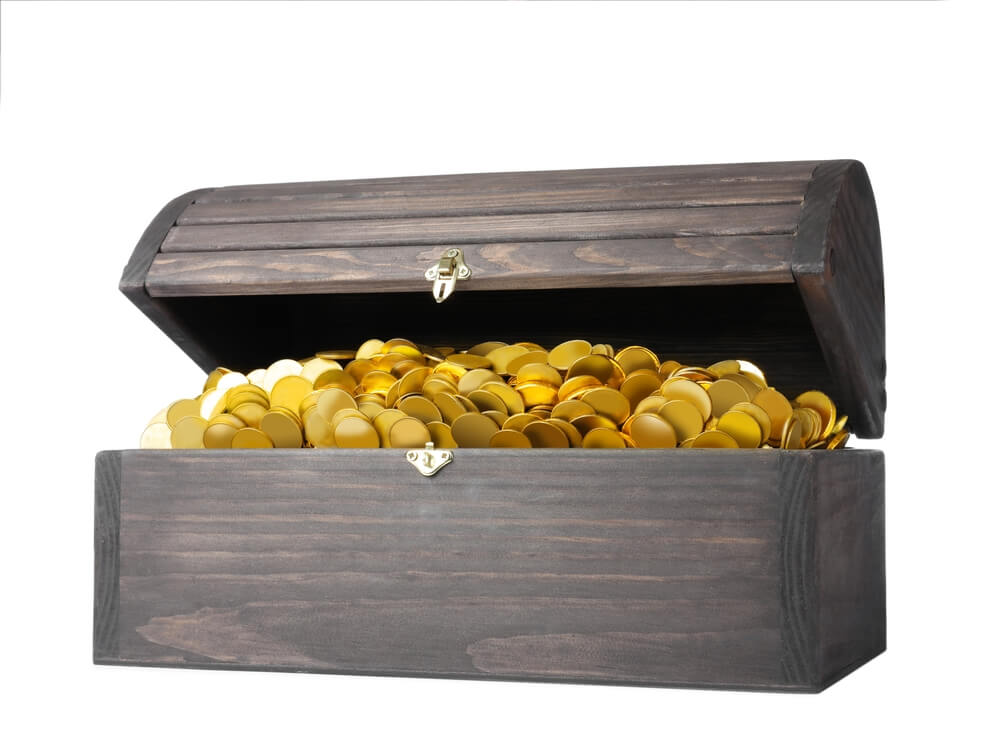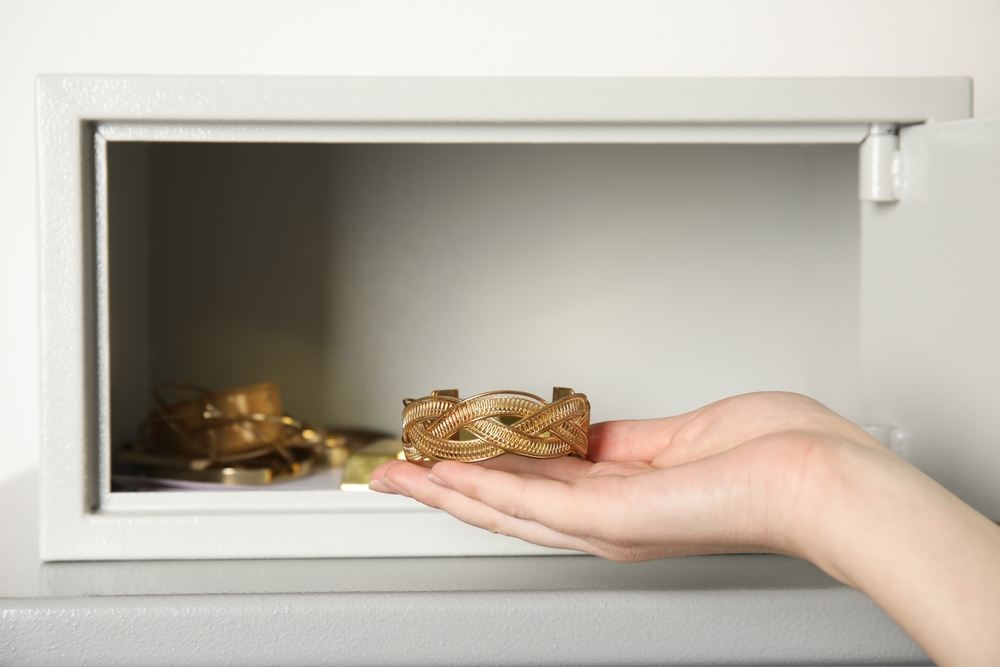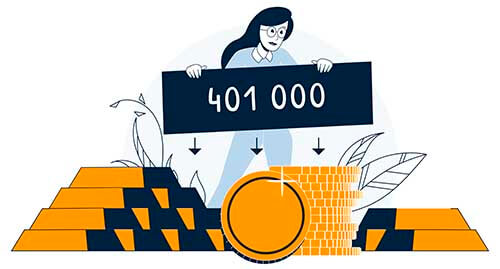
Gold Storage: How to Store Your Gold Properly?
There are different reasons people choose not to buy excessive amounts of gold. Besides the “investment theory” that the precious metal doesn’t play a pivotal role in portfolio growth, storage is another big concern. Unlike digital gold, physical gold is a tangible commodity that needs a room or vault. Not to mention, the storage space has to be secure, safe, and covert.
That begs the question, “Is it worth buying physical gold and putting up with the costs and hassles associated with its safe storage?”

If storage is the only reason you’re holding back and not investing in physical gold, you probably aren’t aware of the multiple gold storage choices at the disposal of investors. The only thing you need to do is learn more about the various storage spaces. Through this article, we’ll help you do just that.
This write-up shall focus on gold storage options, their merits and drawbacks, etc. You can take your pick. The article shall delineate the following:
- The various gold storage options (safe deposit box, depository, etc.)
- Some non-conventional ways to store gold
- Stashing gold outside your homeland
- Answers to some common gold storage questions and more
A few decades ago, storing gold at home wasn’t an ideal solution due to the various federal laws and restrictions. There’s a lot more freedom and flexibility now. That, however, doesn’t mean storing gold in private spaces has become any safer or is the best option. Keep reading to find out more.
Table of Contents
Gold Storage Options
When investors or regular people talk about storage for their gold and other precious metals, the following three options pop up immediately:
At-Home Safes
Private vaults or safes help store gold and other valuables. If you do not fancy the thought of your valuable possessions being supervised by third parties or strangers, storing gold at home is a solid option. Not to mention, gold stored on your property provides you 24/7 access to the metal.
However, the rub with keeping gold or any valuable item in such proximity is “compromised security”. Although private safes are set up in a secret spot and are often camouflaged, a burglar who breaks in when you’re not around will have ample time to locate the safe. And if you do not already have secured storage infrastructure in your house, setting one up can be costly.
Moreover, insurance companies do not cover the contents of private safes, whether it was robbed or damaged by fire. Adding an extra insurance cover may help but not entirely. Needless to say, the added insurance will be costly.
Another major negative to home safes is the lack of space. Gold bullion coins and bars are bulky and heavy. Bars, in particular, can eat up quite a bit of space if the area wasn’t designed to store gold in the bar form. And because expensive jewelry comes in its pretty, elaborative box, it also exhausts a considerable amount of space.
If you still prefer a home storage solution for your gold because you like to keep precious things physically close to you, make sure the safe is water and fireproof.
Positives
- Anytime and nearby access
- No storage fees (except for the initial vault purchase and installation cost)
- Multiple concealed storage options (mattress, fire extinguisher, washing machine, etc.)
Negatives
- Limited storage space
- Major security concerns (no theft or natural disaster protection)
- Limited to no insurance coverage
Read more: Home Storage IRA
Safe Deposit Box
Safety deposit boxes are individually secured containers or metal boxes held in a federally insured credit union or bank’s vault. You can rent the space to store your important documents, valuables, etc. You can use it to keep your gold items safely too.
A bank’s safe deposit boxes are ideal alternatives to storing gold in your house or any private property. It is usually located in a secure spot with video cameras, alarms, and state-of-the-art locking systems. The safe is designed to withstand floods, fires, hurricanes, tornadoes, and other natural disasters.
Upon renting a safe, the bank provides you a key to access the box’s contents. Some banks may also employ a keyless system, such as a fingerprint or palm scanner.
To talk about the negatives, you cannot access your gold stored in a bank vault any time you wish. Banks have working hours or time constraints in place that you must honor. You cannot just walk in and check on your gold bullion and gold coins anytime. And bank vaults are out of bounds on weekends and holidays.
If there’s a sudden rise in the value of gold and you would like to sell your gold to benefit from the market activity, a bank vault may put the brakes on your enthusiasm and prospects of profiting from the trade. By the time you get access to your gold, the short time frame to benefit from the transaction may have elapsed.
Another drawback of storing gold in banks is the non-comprehensive or no proper insurance cover.
Generally, account holders get limited cover for their deposited money in the event of theft or damage. And there’s usually no protection for the precious metals stored in the bank’s vaults. Even the FDIC (Federal Deposit Insurance Corp.) doesn’t protect safe deposit box contents.
In other words, your relationship with your bank can be likened to the arrangement between a landlord (banker) and their tenant. The landlord would not want to be held accountable for anything going wrong at the property (bank).
As the rightful owner of the safe, you must buy separate insurance to cover precious metals stored in bank vaults. However, adding salt to the wound is the harsh reality that insurance companies usually do not protect gold or other precious metals stored in a bank. Not to mention, the few insurance firms that do provide protection charge a hefty premium.
Another pushback with the bank storage option is the absence of federal laws overseeing things. Therefore, if anything goes wrong or you enter a dispute with the bank, you are all by yourself.
Not to mention, space is also at a premium. Although the annual vault charges of less than a hundred to a few hundred dollars aren’t costly, limiting real estate can be an issue. Even the biggest bank safes are generally 10x10 inches and a couple of feet deep.
P.S. Some banks may provide the safe for no cost if you have an account with them holding a specific amount of cash.
Positives
- Much more secure than home storage
- Relatively inexpensive
- A more versatile storage option
Negatives
- No 24/7 access
- No real insurance
- Limited space
Authorized Depository
Precious metal depositories are physical structures dedicated to storing and safeguarding gold. These repositories are precious metals storage spaces of choice for most investors.
The third-party storage facility usually boasts a complete multi-layered security setup, consisting of armed security guards and automated systems. Metal detectors, alarm systems, biometric scanners, and bulletproof doors are par for the course. Moreover, the actual storage environment is climate-controlled, so no heat or cold outside could hamper your precious metal holdings.
The other significant advantage is insurance coverage. The armed and state-of-the-art security measures at repositories are more than adequate. They aren’t impregnable, and repositories acknowledge that. They, thus, add another layer of protection to compensate for unfortunate incidents.
Depositories offer commingled and segregated storage spaces. Commingled spaces are large storage areas wherein valuables of different people are stored together in a congenial environment. If you’d like a specially designated space for your gold, look at segregated storage options.
To learn more about the professional storage options provided by depositories, click here.
The drawback of storing gold in a depository is not seeing the secured gold in person. For safety and security reasons, you cannot just walk into a repository and inspect your holdings. Storage account holders are usually given physical gold-backed digital tokens that provide all essential information about the stored gold.
Moreover, a depository usually doesn’t offer storage services to anybody and everybody. There could be specific requirements, such as a minimum quantity of gold permissible. Gold jewelry may not be acceptable. Also, some depositories could have dedicated their spaces to precious metals procured under an IRA arrangement, such as a gold IRA.
Positives
- 24/7, climate-controlled protection
- Comprehensive insurance
- Multiple storage options
- Easy to resell
Negatives
- No anytime access, similar to banks
- Access may not mean being able to see the gold
- Possibly higher storage fees (depending on your storage requirement or gold’s worth)
“Unconventional” Ways to Store Your Gold

If you’re looking for an off-the-beaten-path storage method, here are a few unconventional ways to store gold:
- Burying the gold in a private property, such as your backyard
- Hiding it under a mattress
- Keeping them in your basement or attic with other items
Note: We do not recommend burying your gold underground or inside a mattress as it’s not safe, and there’s no insurance protection either.
Continue reading only if you acknowledge the risks and pitfalls.
Regardless of how you hide gold, ensure the random hiding places you pick afford proper shelter to your valuables. It’s imperative the spots you choose to bury or hide your gold protects the metal from the elements. Although gold and silver do not corrode in water, please place them in a waterproof cover before planting them under the ground or immersing them in a barrel or fish tank.
You must take special care when hiding proof or graded coins. Keep the coins in their original, airtight packaging. The value and appeal of those certified coins reside in their rarity and physical state. Depending on the coin's actual price, even a minor scratch or two could knock down the value by a few hundred to several hundred dollars. Hiding them under a mattress or squirreling them away in your attic is better than burying them in your backyard.
On the other hand, bullion bars or other items that need not maintain their pristine looks are burying-friendly.
Also, if you’re burying your gold in your backyard, do it when no one notices, preferably after sunset or before dawn. After you’re done with the midnight gardening, camouflage the spot or restore the dug-out place to its original state. The particular area shouldn’t look unusual in any way.
And, to help you locate the spot when you want to dig the gold out, mark it down. The visual cue should be easy to discern but also not invite suspicion.
Storing Gold Offshore
A piece of gold investment helps diversify any portfolio. Adopt a similar approach when storing gold too. Consider putting your gold in local depositories and safes and outside your country of residence.
Before delving further into offshore gold storage, let’s list the reasons keeping gold in a foreign country makes sense:
- Gold stored in another country ensures your home government cannot confiscate the asset at discretion.
- Besides no sovereign risk, theft concerns are also much lower, thanks to the highly secure environment of the particular place. Even the country’s general population is likely to be unaware of the high-security vaults.
- The offshore storage facility can also sell your gold when you instruct them to, wiring the proceeds funds to your bank account almost immediately after the sale.
Points to note:
Other than the remote location, there’s pretty much no negative with offshore gold storage, provided you could stay on top of the following:
- Do not put all or a significant chunk of your gold holdings in a foreign country. If you want quick (if not immediate) access to your gold and silver holdings, keeping them secured nearby is essential.
- Not every foreign region is ideal for storing your assets. Look for countries with safe-haven jurisdictions and solid track records.
- Do not store gold in neighboring countries or nations with strong alliances with your home country. For instance, if you live in America, don’t stash your gold in Canada. Doing so wouldn’t be any different from storing gold in America. Look for relatively isolated regions that are not easily pressurized by other countries.
- See beyond a country’s status as a “haven”. Ascertain how good their vault infrastructure is. Store your gold somewhere else if the storage vaults aren’t secure and modern enough.
- Make sure the banking infrastructure of the region is solid, with qualified professionals overseeing activities. You should be able to communicate with the vault authorities effortlessly, and the place must be able to wire funds to any part of the world.
Some of the best countries to safeguard your gold include:
- Singapore: Also called the Switzerland of Asia, the wealthy South Asian country is efficient, modern, and responsive with little to no corruption or crime. The only drawback is its geographical distance from the West.
- New Zealand: The island is a developed economy with a neutral geopolitical stance and a wealth-friendly government. The remote location means it’s pretty isolated from all of the world’s chaos and problems.
- Switzerland: The Swiss Confederation is the OG wealth haven, with one of the world’s largest gold per capita reserves. The country may not be the most cost-efficient, perhaps thanks to its immense popularity. But in terms of security and safety, every few countries come close to Switzerland.
Other countries worth mentioning include the Cayman Islands, Norway, Austria, and Germany.
Read more: How to Clean Tarnished Gold
Conclusion
Proper storage of gold is critical, and the resources, time, and effort invested in setting up the above-mentioned storage setups validate that point.
A depository is undoubtedly the most secure of the three precious metals storage options discussed above. However, it doesn’t shelter valuables that aren’t physical metals, such as paper documents.
Moreover, not everybody requires depository-level protection for their gold. A bank vault’s limited but relatively safe storage options may be enough for some. And then there’s always the choice to keep gold at home. Although the least secure option of the three, the easy accessibility aspect may trounce the other choices for some people.
Long story short, ascertain your gold or precious metals storage requirements before zeroing in on a storage method. A depository may have served your friend’s storage purposes to the T. But your need to secure gold and precious items may not fall in line with a repository setup.
FAQs
Is there a limit to how much gold you can store at home?
There is no upper limit to how much gold you could safely store on your property. Just make sure those holdings are reported to the IRS or their taxes are duly paid.
What is the best storage choice for gold?
Between a bank safe, your private safe, and a depository, depositories are the safest storage space for your gold and other precious metals.
The number of bullion storage repositories has increased from a handful to hundreds between pre-2008 and now, which is proof depositories are being increasingly preferred. These private vault companies are growing in terms of locations, and the existing spaces are also expanding.
Banks that were once considered safe havens are slowly falling out of favor with their most feal patrons, who are now looking for storage choices that aren’t bank-run.
Personal safes trail both bank vaults and depositories in pretty much every aspect. There have been horror stories of people losing their hard-earned savings stored as gold and silver in their houses or buried in backyards to burglars. Criminals are getting technologically advanced, using metal detectors to locate gold stored beneath the soil.
The only aspect in which a home storage solution fares better is the no red tape associated with accessing gold. Even if you visit a bank during work hours, there may be certain formalities you must fulfill before seeing and touching your gold and silver belongings. With repositories, access is much more complex.
Can I store gold-related documents in a bank vault?
Yes, you may store a gold certificate or any document that proves ownership of gold in a bank vault. You may store bullion coin authenticity certificates, for instance. Make sure you keep only those documents you won’t need frequently or would like quick access to.
If you’d like to have the document handy at all times, store it in some secure place in your house instead. And because bank safes aren’t the “safest”, keeping sensitive documents in a bank is not advisable.
By the way, gold depositories do not store documents. They only deal with precious physical metals.


